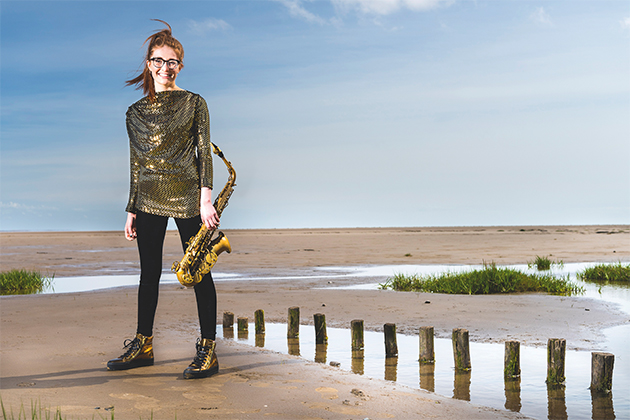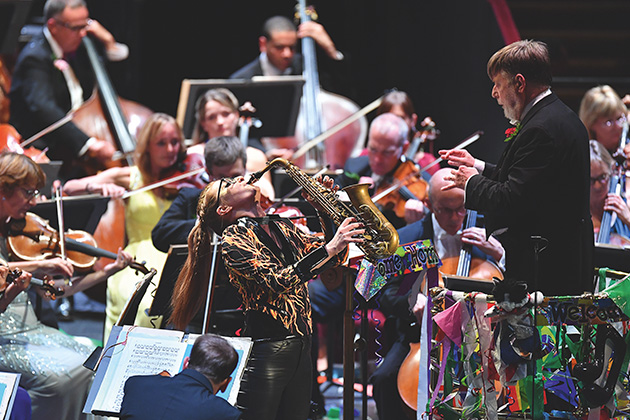It takes something special to cut through a century of tradition and lighten the lumbering load of nostalgia for a mythical past. Jess Gillam managed to do both at 'The Last Night Of The Proms'. The saxophonist, only just out of her teens, reinforced her rising-star status with a scintillating performance of Milhaud’s Scaramouche, hailed by critics as one of the annual show’s brightest highlights.
She began her evening’s work with a date at Proms in the Park before racing to the Royal Albert Hall to join the BBC Symphony Orchestra and Sir Andrew Davis. Surrounded by Union Jacks and other symbols of Britannia’s imagined communities, Gillam did much more than nail a virtuoso showpiece.
 Jess Gillam has heightened the profile of the saxophone in classical music and is now looking to extend its repertoire. © Phil Rigby Bay Living
Jess Gillam has heightened the profile of the saxophone in classical music and is now looking to extend its repertoire. © Phil Rigby Bay Living
How Gillam triumphed at the Proms
Here was a young woman from Cumbria, wearing gold Doc Martens and glitter in her hair, making Milhaud’s jazz-infused, rumba-tinged composition sound as fresh as when it was first minted eighty years ago. “For me it was all about the music, but the experience was surreal,” she recalls. “Just to go out and enjoy it was the thing for me. I don’t really have specific goals, but when I was younger, I really wanted to play at the Royal Albert Hall. I do get nervous, although the more I perform, the better it becomes. But I still get nervous and am not always calm. The shape of the Albert Hall makes it feel like an intimate and warm space, even when it’s completely packed. You step out there and feel you’re in a small concert hall. It’s very special.”
Sax soloist tuition at the Royal Northern College of Music
Jess Gillam’s Proms triumph marked the latest chapter in an unfolding good news story for classical music. She made her breakthrough as the first saxophonist to reach the final of the BBC Young Musician competition, and has since been signed by Decca Classics and Polyarts, a partner of leading classical agents Harrison Parrott. Her Decca debut album – the first by a classical saxophonist in the label’s long history – was released in 2019. The company issued two taster singles – Michael Nyman’s 'If' and the barnstorming 'Brazileira' from 'Scaramouche' – in time for Gillam’s Last Night outing. Although her bookings diary filled up fast, she continued to study with John Harle at the Royal Northern College of Music (RNCM), learning from a performer who pioneered the career of classical sax soloist in the UK.
How her natural broadcasting skills brought her to the attention of BBC Radio 4
Gillam is blessed with a natural generosity and warmth of character, qualities that register as brightly in the way she speaks about music as in the way she makes it. Regular listeners to BBC Radio 4’s 'Today' programme will remember her weekly appearances with James Naughtie during the Proms season, not least for her considered comments and passion for music of all kinds. She honed her media skills as co-presenter of the BBC’s 'Young Musician' podcasts, tackling everything from exam stress and performance anxiety to the nuts-and-bolts of being a professional musician.
 © Live at The Proms: BBC / Chris Christodoulou
© Live at The Proms: BBC / Chris Christodoulou
“Music is such a powerful form of communication,” she observes. “It should be at the centre of human experience. If people lose the opportunity to be exposed to it and engage with it at a young age, then it’s almost too late by the time they reach their teenage years to start learning an instrument. Of course it’s never too late! But I think we have to make sure that young people have that experience, especially of live music. There’s so much available to stream, download or watch online, but I think we must never forget that electrifying experience of the live concert and make sure that young people can share in it.”
Connecting with an audience
Gillam has always spoken to audiences of all ages. The performer, she argues, is there to lead people into the emotional world of a composer’s work, not to stand above the crowd. “It’s not always necessary or appropriate to say something about a piece during a concert. But for me it helps make connections with an audience, which is an essential part of being a musician. Most of the time, we’re performing music created by others. It’s not about me, it’s about their music. I like to think that I’m grounded, and putting the music first is one of the things that helps keep me there.
“When I began the 'Young Musician' podcasts I realised that audiences are not always aware of the work that goes on before a concert and what it takes to be a musician. If people discover something about the hours of preparation we put in, it might encourage them to come to concerts. I believe that removing some of the mystery from classical music can open doors to people without damaging the music itself.”
Community spirit: musical roots in Cumbria
Gillam’s introduction to live music-making was unusual for someone raised in Ulverston. “There wasn’t a huge amount of music there,” she recalls. “But I started in a carnival band.” A carnival band? In Cumbria? She laughs, before tracing her musical roots to the Barrow Carnival. “I know it sounds mad, but my dad played percussion there, so it was completely normal for me. It seems odd now looking back, but we had musicians and dancers coming over from Brazil to teach us samba rhythms.”
The Barrow band, she adds, was based in a deprived area of the Cumbrian coastal town. “It provided children and people of all ages with somewhere to go and enjoy regardless of their background. It was all about the community spirit and creating something together. We had fun. That’s what I try to bring to the classical stage today. I absolutely loved playing the saxophone. It was something I enjoyed so much.”
Joining the Junior RNCM
Gillam’s enjoyment soared when she was taken to hear the Kaleidoscope Saxophone Quartet. The 10-year-old Jess discovered what her instrument could do in a classical setting and was soon taking lessons from the group’s soprano saxophonist, who was then a student at the Royal Northern College of Music. Three years later, encouraged by her supportive parents, she enrolled at the Junior RNCM, the Royal Northern’s Saturday school, and began making the long weekly round trip from Ulverston to Manchester.
“The teaching was very much about developing a rounded musical education,” she notes. “We had lessons in musicianship, improvisation and harmony. It was a very centred experience, quite holistic in many ways. I took inspiration from all the areas we covered at the RNCM. Now I have an incredible teacher in John Harle. I’m very lucky to study with him.”
How the MU creates a community of musicians
When offers of professional work began to flow, Gillam was quick to join the Musicians’ Union. She already understood the power of the Labour movement and its value in standing up for collective interests. “My dad was always in the MU – I remember seeing the MU Diary around the house and him using it. When I started playing, he said I should look into joining. I think it feels like belonging to a community, a genuine family of musicians.”
While the saxophonist regards music as her calling, she’s adamant that professional musicians should be properly paid for their work. “It takes a certain type of person to be a musician. I think the MU really brings those like-minded people together, and respects the fact that music is a hugely worthwhile profession in society. We need organisations like the MU to create this community of musicians and to encourage the next generation.”
Extending the repertoire of the saxophone
After fulfilling her ambition of releasing an album Gillam is now looking to commission new music for the saxophone and extend its repertoire. “I have no specific goals other than to reach as many people as possible, spread the joy of music-making far and wide, and always to try to inspire young people.”
Her approach to the latter will definitely not be hidebound by genre. It will develop from an appreciation of the way people today listen to boundary-defying music playlists.
Challenging perceptions of classical music
“I think clear-cut genres are becoming less relevant as music of all kinds is heard as something that we react to emotionally,” she notes. “Perhaps the categorisation of music will change over the coming decades as we change the way we listen to it more and more. I’m sure this will break down the perception people have of classical music as elitist, as it becomes part of a whole landscape of music where how things are labelled no longer matters. Of course, the danger is that we become hooked on singles and never sit down to listen to a complete symphony. That’s where live performance is so important. It’s something that everyone should be able to experience, something every musician should fight for, something that society needs.”